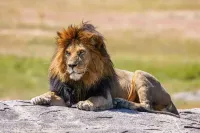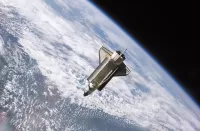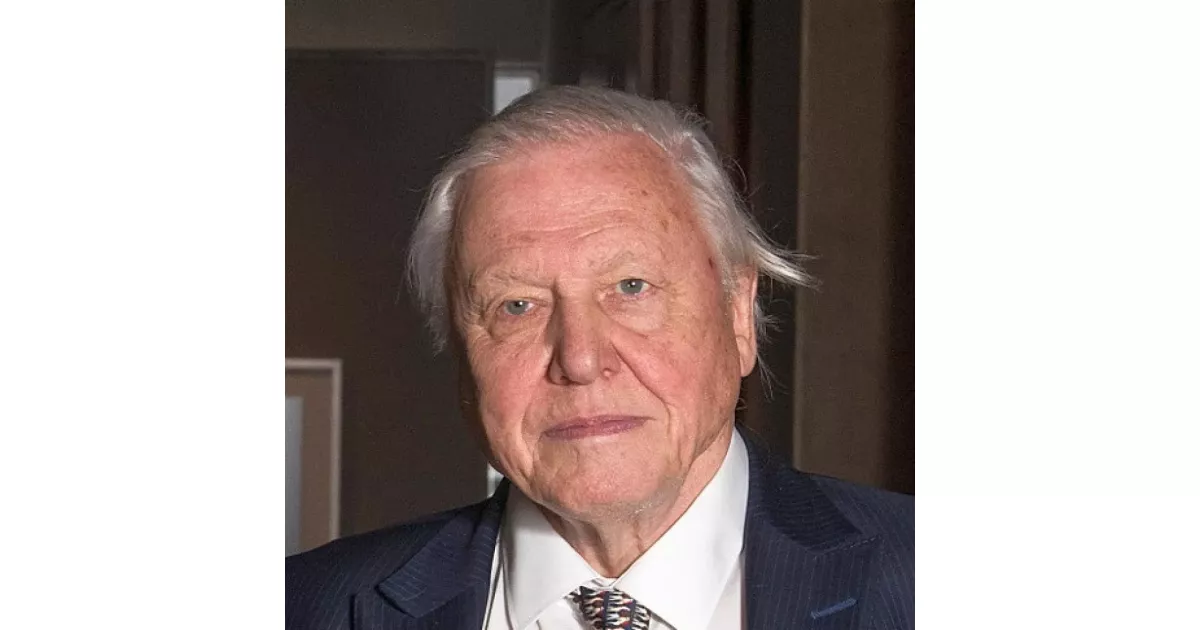Sir David Attenborough is a highly influential British broadcaster, biologist, and natural historian, renowned for his decades-long career in wildlife documentary filmmaking. Beginning with Zoo Quest in 1954, he has written, presented, and narrated numerous acclaimed series, including The Life Collection and the Planet Earth franchise. He is celebrated for his contributions to raising environmental awareness. Attenborough has received numerous awards, including multiple BAFTA and Emmy Awards, acknowledging his pioneering work in natural history broadcasting and conservation advocacy.
May 1926: David Attenborough's Birth
In May 1926, David Frederick Attenborough was born in Isleworth, Middlesex. His father, Frederick, was the principal of University College, Leicester. He grew up in College House on the university campus.
1936: Influence of Grey Owl
In 1936, David Attenborough and his brother Richard attended a lecture by Grey Owl (Archibald Belaney) in Leicester. Grey Owl's conservation advocacy profoundly influenced David.
1945: Scholarship to Clare College, Cambridge
In 1945, Attenborough won a scholarship to Clare College, Cambridge, to study geology and zoology.
1947: National Service in the Royal Navy
In 1947, Attenborough was called up for national service in the Royal Navy. He spent two years stationed in North Wales and the Firth of Forth.
1950: Job Application at the BBC
In 1950, after becoming disillusioned with editing children's science textbooks, Attenborough applied for a job as a radio talk producer with the BBC, but was rejected.
1952: Joins BBC Full-Time
In 1952, David Attenborough joined the BBC full-time and became a producer for the Talks department, which handled all non-fiction broadcasts.
1954: Zoo Quest Debut
In 1954, David Attenborough rose to prominence as the host of Zoo Quest.
1957: Filming at Great Barrier Reef
In 2015, David Attenborough returns to film "Great Barrier Reef" at a location he first filmed at in 1957.
1964: BBC Two Launched
In 1964, BBC Two was launched and Attenborough shook up the schedule after becoming controller, establishing programs that defined the channel's identity. Programmes he commissioned included Man Alive, Call My Bluff, Chronicle, The Old Grey Whistle Test, Monty Python's Flying Circus and The Money Programme. Pot Black was also launched showing the benefits of colour television.
March 1965: Controller of BBC Two
In March 1965, Attenborough became Controller of BBC Two, succeeding Michael Peacock.
1969: Civilisation Broadcast
In 1969, "Civilisation", presented by Sir Kenneth Clark, was broadcast to universal acclaim on BBC Two after Attenborough ordered a 13-part series on the history of Western art. Other series followed including Jacob Bronowski's The Ascent of Man.
1969: Series on Bali
In 1969, Attenborough made a three-part series on the cultural history of the Indonesian island of Bali.
1969: Promotion to Director of Programmes
In 1969, Attenborough was promoted to director of programmes at the BBC.
1969: Creation of The World About Us
In 1969, David Attenborough created "The World About Us" as a vehicle for colour television.
1971: Filming A Blank on the Map
In 1971, Attenborough joined the first Western expedition to a remote highland valley in New Guinea to seek out a lost tribe, documented in the film "A Blank on the Map".
1972: Director-General Candidate
In 1972, when Attenborough's name was suggested for the position of Director-General of the BBC, he confessed that he had no appetite for the job.
1975: Television Projects
In 1975, David Attenborough presented a series on tribal art titled "The Tribal Eye", another on the voyages of discovery titled "The Explorers", and a BBC children's series about cryptozoology entitled "Fabulous Animals".
1977: Narration of Wildlife on One
In 1977, David Attenborough began narrating every episode of "Wildlife on One", a BBC One wildlife series.
1979: Life on Earth Release
Beginning with the release of "Life on Earth" in 1979, Attenborough established a benchmark of quality in wildlife film-making, influencing a generation of documentary film-makers.
1979: China's One-Child Policy
In 1979, Attenborough visited the People's Republic of China and reported to the West for the first time about the Chinese one-child policy.
1987: The First Eden series
In 1987, David Attenborough wrote and presented "The First Eden", a series on man's influence on the natural history of the Mediterranean Basin.
1987: "Meerkats United" Episode of Wildlife on One
In 1987, the "Meerkats United" episode of "Wildlife on One" was voted the best wildlife documentary of all time by BBC viewers.
1990: Work on Prisoners of Conscience series
In 1990, David Attenborough worked on the BBC's "Prisoners of Conscience" series, highlighting the case of the Sudanese poet Mahjoub Sharif.
1990: The Trials of Life Completed
In 1990, The Trials of Life was released, completing the original Life trilogy, looking at animal behaviour through the different stages of life.
1993: Life in the Freezer
In 1993, David Attenborough presented "Life in the Freezer", the first television series to survey the natural history of Antarctica.
1995: The Private Life of Plants
In 1995, Attenborough presented "The Private Life of Plants", which showed plants as dynamic organisms using time-lapse photography. The series went on to earn a Peabody Award.
1997: Narration of BBC Wildlife Specials
In 1997, David Attenborough narrated the BBC Wildlife Specials, each focusing on a charismatic species and screened to mark the Natural History Unit's 40th anniversary.
1998: The Life of Birds
In 1998, Attenborough made "The Life of Birds" on the theme of behaviour. The documentary series won a second Peabody Award the following year.
1999: Grey Owl Biographical Film
In 1999, Richard Attenborough directed "Grey Owl", a biographical film about Archibald Belaney (Grey Owl).
2000: Release of State of the Planet
In 2000, David Attenborough's documentary "State of the Planet" assessed the impact of human activities on the natural world.
2001: Narration of The Blue Planet
In 2001, David Attenborough narrated "The Blue Planet", the BBC Natural History Unit's first comprehensive series on marine life.
2002: The Life of Mammals
In 2002, Attenborough's "The Life of Mammals" utilized low-light and infrared cameras to reveal the behavior of nocturnal mammals.
2002: Publication of Life on Air
In 2002, David Attenborough's autobiography, Life on Air, was published, marking a significant milestone in documenting his life and career.
2003: Launch of ARKive
In 2003, David Attenborough helped to launch ARKive, a global project to gather natural history media into a digital library.
2003: Launch of Rainforest Reserve Appeal
In 2003, David Attenborough launched an appeal on behalf of the World Land Trust to create a rainforest reserve in Ecuador in memory of Christopher Parsons.
2004: Lecture Convinces Attenborough of Human Influence on Climate Change
In 2004, a lecture finally convinced David Attenborough that humans were responsible for climate change.
2005: Life in the Undergrowth
In 2005, "Life in the Undergrowth" introduced audiences to the world of invertebrates, made possible by advances in macro photography.
2005: Backing BirdLife International Project
In 2005, David Attenborough backed a BirdLife International project to stop the killing of albatross by longline fishing boats.
2005: End of Wildlife on One
In 2005, David Attenborough finished narrating "Wildlife on One", a BBC One wildlife series that ran for 253 episodes.
2006: Attenborough Begins Speaking Out on Climate Change
David Attenborough had been skeptical of human influence on climate change, remaining silent on the issue until 2006 when he began speaking out about it.
2006: Supporting WWF's Campaign
In 2006, David Attenborough gave support to WWF's campaign to have 220,000 square kilometres of Borneo's rainforest designated a protected area.
2006: Release of The Truth about Climate Change
In 2006, David Attenborough released "The Truth about Climate Change", focusing on the issue of global warming.
2008: Completion of "Life" Series with Life in Cold Blood
In 2008, David Attenborough completed his collection of programmes on all the major groups of terrestrial animals and plants with the broadcast of "Life in Cold Blood", filling the gap of reptiles and amphibians. This entire collection was brought together in a DVD encyclopaedia called "Life on Land".
January 2009: Commission of David Attenborough's Life Stories
In January 2009, the BBC commissioned David Attenborough to provide a series of 20 ten-minute monologues covering the history of nature, entitled "David Attenborough's Life Stories", which were broadcast on Radio 4 on Friday nights.
2009: Release of How Many People Can Live on Planet Earth?
In 2009, David Attenborough released "How Many People Can Live on Planet Earth?", addressing the issue of human population growth.
2009: Revision of Life on Air
In 2009, David Attenborough's autobiography, Life on Air, was revised, indicating continued interest and relevance of his life story.
2010: Assertion of Including First Life in the Life Series
In 2010, David Attenborough asserted that his "First Life", which deals with evolutionary history before "Life on Earth", should be included within the "Life" series, stating that it completes the set in the documentary "Attenborough's Journey".
2010: Debut of Flying Monsters 3D
In 2010, David Attenborough partnered with Sky, and their first collaboration was "Flying Monsters 3D", a film about pterosaurs which debuted on Christmas Day.
2011: Role in Frozen Planet
In 2011, David Attenborough had a prominent role in "Frozen Planet", a major series on the natural history of the polar regions, where he appeared on screen, authored the final episode, and performed voiceover duties.
September 2014: Presentation of Tweet of the Day
In September 2014, David Attenborough continued as one of the presenters of BBC Radio 4's "Tweet of the Day", which began a second series.
October 2014: Announcement of New Attenborough Documentaries
In October 2014, the BBC announced a trio of new one-off David Attenborough documentaries: "Attenborough's Paradise Birds", "Attenborough's Big Birds", and "Waking Giants".
2015: Great Barrier Reef Series
In 2015, Atlantic Productions created a three-part, David Attenborough-fronted series called "Great Barrier Reef".
2015: David Attenborough's Natural Curiosities Series 3
In 2015, David Attenborough narrated the third series of "David Attenborough's Natural Curiosities" for the UKTV channel Watch.
2016: Reflection on Terry Wogan's Job Application
In 2016, Attenborough reflected on his decision to turn down Terry Wogan's job application to be a presenter on BBC Two in the past, citing concerns about having two Irish presenters.
2016: Return as Narrator and Presenter for Planet Earth II
In 2016, David Attenborough returned as narrator and presenter for "Planet Earth II", with the main theme music composed by Hans Zimmer.
2017: Release of Blue Planet II
In 2017, David Attenborough returned as presenter for "Blue Planet II", which was critically acclaimed and gained the highest UK viewing figures for 2017.
2018: Narration of Dynasties
In 2018, David Attenborough narrated the five-part series "Dynasties", with each episode focusing on one species.
2018: Remarks on Environmental Messaging
In 2018, while promoting "Dynasties", David Attenborough said that repeated messages on threats to wildlife in programming could be a "turn-off" to viewers.
2019: Narration of Our Planet for Netflix
In 2019, David Attenborough narrated "Our Planet", an eight-part documentary series for Netflix, emphasizing the destructive role of human activities.
2019: Release of Climate Change – The Facts
In 2019, David Attenborough's one-off film documentary about climate change for BBC One called "Climate Change – The Facts" was aired; the tone of the documentary was significantly graver than his previous work for the BBC.
2019: Praise for Increased Urgency of Environmental Messaging
In 2019, films such as "Extinction: The Facts", depicted the continuing sixth mass extinction, received praise for the increased urgency of environmental messaging.
October 2020: Filming for The Green Planet in Cambridge
In October 2020, David Attenborough began filming in Cambridge for "The Green Planet".
October 2020: Release of David Attenborough: A Life on Our Planet on Netflix
In October 2020, the documentary film "David Attenborough: A Life on Our Planet" was released on Netflix, reflecting on his career and hopes for the future.
2020: Advocacy for the Zoological Society of London
During the COVID-19 pandemic, David Attenborough advocated on behalf of the Zoological Society of London (ZSL) and its conservation efforts.
2020: Praise for Increased Urgency of Environmental Messaging
In 2020, "A Life on Our Planet" received praise for the increased urgency of environmental messaging.
2020: Backing Campaign Against Deep Sea Mining
In 2020, David Attenborough backed a Fauna and Flora International campaign calling for a global moratorium on deep sea mining for its impact on marine life.
2020: Appointment to Earthshot Prize Council
In 2020, David Attenborough was named as a member of the Earthshot Prize Council, an initiative of Prince William to find solutions to environmental issues.
2020: Call for Reduced Meat Consumption
In his 2020 documentary film "David Attenborough: A Life On Our Planet", David Attenborough advocates for people to adopt a vegetarian diet or reduce meat consumption.
June 2021: Release of Breaking Boundaries: The Science of Our Planet on Netflix
In June 2021, the documentary titled "Breaking Boundaries: The Science of Our Planet" was released on Netflix.
2021: Speech at COP26 Opening Ceremony
In 2021, David Attenborough gave a speech at the opening ceremony of the 2021 United Nations Climate Change Conference (COP26), expressing optimism for the future.
2021: Presentation of Attenborough's Life in Colour and The Mating Game
In 2021, David Attenborough presented the three-part series "Attenborough's Life in Colour", and "The Mating Game", a five-part series.
May 2022: Airing of Prehistoric Planet
In May 2022, David Attenborough's "Prehistoric Planet" aired.
2022: Recognition as a Champion of the Earth
In 2022, the United Nations Environment Programme recognised David Attenborough as a Champion of the Earth for his dedication to research, documentation, and advocacy for the protection of nature and its restoration.
Mentioned in this timeline

Elizabeth II reigned as Queen of the United Kingdom and...

The lion Panthera leo is a large cat species native...
India officially the Republic of India is a South Asian...

Christmas is an annual festival celebrated on December th commemorating...
The Guardian is a British daily newspaper founded in as...
China officially the People's Republic of China is an East...
Trending

58 minutes ago Lakers Seek to Unlock Ayton's Greatness While Hayes Shines, Exposing Unwanted Truth.

58 minutes ago Jrue Holiday NBA DFS picks, lineups, and player prop bets for February 24.

58 minutes ago Julius Randle's Injury Update: Chris Finch Comments, Randle Scores 18 in Loss
58 minutes ago Jaden McDaniels excels as scorer, boosting Timberwolves with underrated skills this year.

59 minutes ago NBA Southeast Notes Discuss Trades, Desmond Bane's Performance, and Wendell Carter Jr.

2 hours ago Space Force Upgrades, Battle Management, and Role in Raids Spark Resource Push
Popular

Jesse Jackson is an American civil rights activist politician and...

Susan Rice is an American diplomat and public official prominent...

Barack Obama the th U S President - was the...

Michael Joseph Jackson the King of Pop was a highly...

Bernie Sanders is a prominent American politician currently serving as...

XXXTentacion born Jahseh Dwayne Ricardo Onfroy was a controversial yet...

